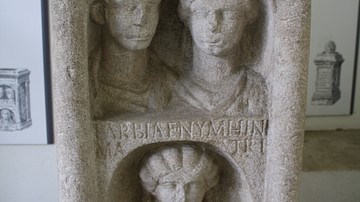Search
Did you mean: Elam?
Search Results

Article
Family Planning in the Ancient Near East
The ancient Near East was home to a multitude of civilizations, across Egypt, Mesopotamia, and the Levant, each with unique views on medicine, conception, and women’s role in society. Attitudes towards contraception and abortion varied according...

Definition
Reign of Terror
The Reign of Terror, or simply the Terror (la Terreur), was a climactic period of state-sanctioned violence during the French Revolution (1789-99), which saw the public executions and mass killings of thousands of counter-revolutionary 'suspects'...

Article
Badger-Woman
Badger-Woman is a story of the Arapaho nation about a noble young hunter who refuses the advances of his sister-in-law and is then betrayed by her. The tale is similar to those of other civilizations, notably Two Brothers (The Fate of an...

Definition
Pharisees
The Pharisees were a Jewish sect that emerged c. 150 BCE and promoted the idea of priestly purity for all Jews, belief in providence or fate, and the concept of the resurrection of the dead, and taught that besides the commandments, Oral...

Definition
John Marshall
John Marshall (1755-1835) was an American lawyer and statesman, who served as the fourth chief justice of the United States Supreme Court from 1801 until his death in 1835. Considered one of the most influential chief justices in US history...

Article
Virginia Slave Laws and Development of Colonial American Slavery
Racialized chattel slavery developed in the English colonies of North America between 1640-1660 and was fully institutionalized by 1700. Although slavery was practiced in the New England and Middle colonies, and Massachusetts Bay Colony passed...

Definition
Consul
In 509 BCE, with the exit of the last Etruscan king, Lucius Tarquinius Superbus, the Roman people were presented with a unique opportunity, an opportunity that would eventually have an immense impact on the rest of Europe for centuries to...

Definition
Night of the Long Knives
The Night of the Long Knives (aka Blood Purge or Röhm-Putsch) of 30 June 1934 was a purge of the Nazi Sturmabteilung (SA) paramilitary group which continued through 1 and 2 July. Adolf Hitler (1889-1945), wary of the growing power of the...

Article
Ancient Roman Family Life
Whether there was a king, a consul, or an emperor that stood supreme over Rome and its territories, the one constant throughout Roman history was the family. Like many earlier societies, the family was the fundamental social unit in the eternal...

Article
Sermon on the Mount
The Sermon on the Mount in the Gospel of Matthew (chapters 5, 6, and 7) became a foundational element of the religion of Christianity. The sermon is based on the traditions of Judaism and the Law of Moses, but with added interpretations of...